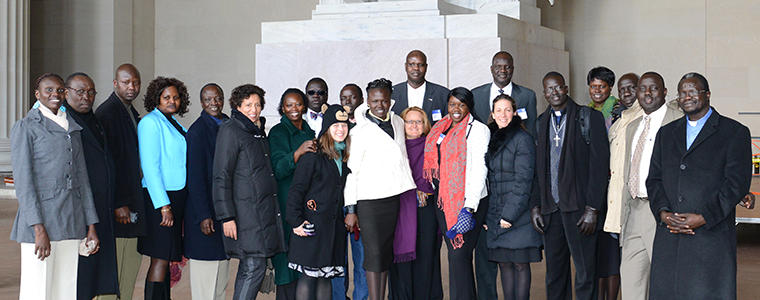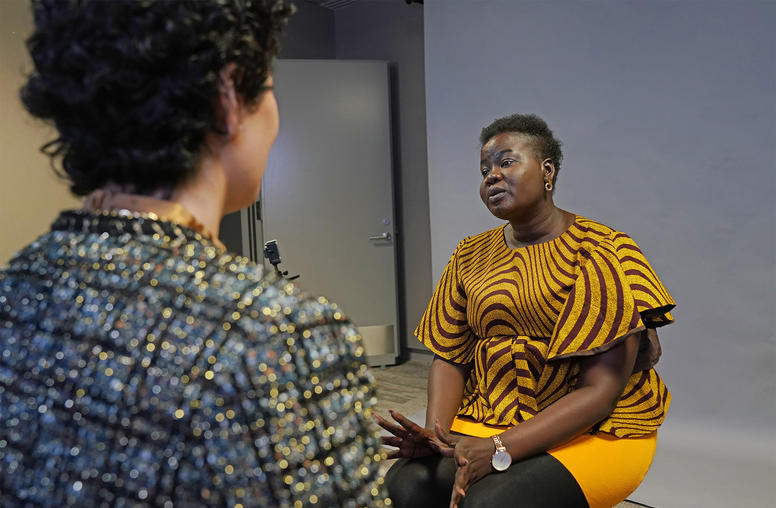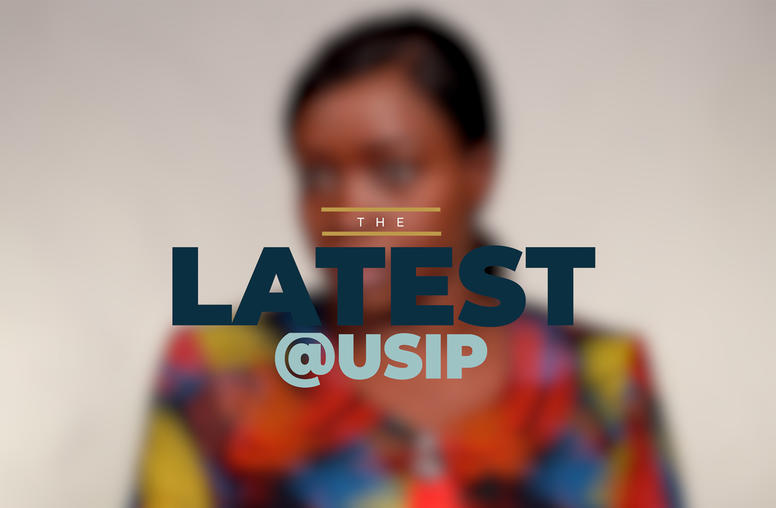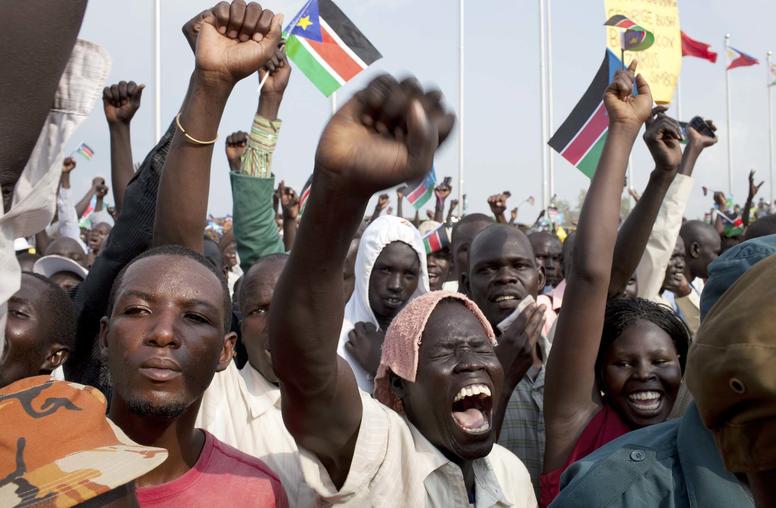South Sudanese Diaspora Leaders at USIP Consider Online Speech Concerns
Members of the South Sudanese diaspora gathered at the U.S. Institute of Peace (USIP) last week to explore ways of fostering their national unity, supporting peace efforts in a conflict with tribal dimensions and countering online speech that disparages people of other tribes.

The February 6-7 workshop brought together 20 South Sudanese who are community leaders or activists in the United States and who maintain significant contacts with people in their homeland. Instructors from USIP identified participants and organized the conversations, and the group received a briefing from Ambassador Donald Booth, the U.S. special envoy to Sudan and South Sudan.
The South Sudanese, who come from a variety of tribal backgrounds and regions of South Sudan, as well as personal and professional experiences, expressed a desire to work together to encourage their countrymen to avoid rhetoric that triggers animosity, feeds polarizing stereotypes or blames those from other tribal backgrounds for their nation’s internal conflict. As one put it in the concluding session, “We ought to identify ourselves as South Sudanese rather than by tribe.”
“Each tribe has a pre-conceived idea of other tribes,” said one South Sudanese participant who lives in Virginia, Natalina Malwal. “Social media has been used to fuel it—using antagonistic language….The choice of words is very important right now. People need to think about it two or three times before they write it.”
South Sudan, the world’s newest independent nation, includes a patchwork of tribes spread across a large but impoverished land. A simmering political dispute involving the current president, Salva Kiir, and the former vice president, Riek Machar, broke into violence in mid-December, quickly leading to fighting between units of the national army and militia groups along with attacks and reprisals targeting specific ethnic groups, particularly between members of the Dinka and Nuer tribes.
More than 10,000 South Sudanese are believed to have died in the ensuing fighting, and about 770,000 have fled their homes. A ceasefire between representatives of Kiir and Machar was signed on January 23, but some of its terms have not been fulfilled and smaller-scale fighting has continued. Peace talks that were to have resumed on February 10 did not begin on schedule amid sharp tensions between the two camps.
The gathering of influential diaspora leaders—all of whom were recommended by other South Sudanese—was intended to help jumpstart awareness among South Sudanese at home and abroad about online comments that are propagating stereotypes, discrimination and blame of ethnic groups and about online opportunities to convey attitudes conducive to supporting unity and peace efforts. “We want them to disseminate this information back to their communities and share it,” said Jacki Wilson, a workshop organizer and senior program officer at USIP’s Academy for International Conflict Management and Peacebuilding. She was joined in guiding the workshop by two Institute colleagues—Linda Bishai and Alison Milofsky.
Bishai, a senior program officer in USIP’s Center for the Middle East and Africa, urged participants to re-examine any prejudices they and others might harbor and to be aware of intolerance. “This isn’t genetic—in your DNA. You can challenge it,” she said. “You have to question why you were taught that those people are less worthy than you.”
Milofsky, a senior program officer with the Academy, said it was important to be “thinking about how to phrase things in ways that reduce a person’s defensiveness,” adding later, “We’re talking about being open to multiple perspectives.”
USIP and other specialists watching social media and other online commentary about South Sudan’s conflict have spotted numerous instances of disparaging speech that reveal deep anger and stereotyping of other groups. The degree to which that online speech has encouraged specific violence in South Sudan is unclear, but there is a recent and tragic history to recall in which media messages helped foment tribal violence, including radio’s role in the 1994 Rwandan genocide and hate speech transmitted on radio and online after Kenya’s 2007 elections.
The group reviewed online comments to articles posted on the well-known news source “Sudan Tribune.” Though the passages seemed relatively benign at first glance, the participants quickly identified racial slurs, “trigger” words that antagonize certain groups and convey superiority, polarizing and dividing rhetoric and even dehumanizing terms. The exercise seemed to be eye-opening for the group, stirring emotions but also providing a powerful learning opportunity.
By contrast, some online comments related to the South Sudan conflict have called for national unity and leadership. “Our leader should be like a Mandela,” said one. “It is time to unite, to work together, to reform ourselves and be a [sic] nationalists.” Said another message, “I don’t support war… this is not the time to blame or accuse one another.”
Wilson said that “dehumanizing” others online or elsewhere can fuel a “revenge mentality” and hatred, and South Sudanese should think about ways to counter it. “If you don’t confront [such speech], you’re a bystander,” she said. “The weight of responsibility is on you.”
Jok Madut Jok, a former official in the South Sudanese government and now chairman of the board of the USIP-supported and Juba-based Sudd Institute, urged the group to use social media and other online exchanges to promote peace and tolerance. According to Jok, “we could hide behind the anonymity of the Internet and spew out nonsense about each other. …But there is still a voice of reason in all of us that can be harnessed.” He added, “It takes one person to change things.”
Jane Abucha, a South Sudanese nurse-practitioner who now lives in the Phoenix area, said the workshop will be helpful, but its themes “need to be expanded to other communities,” including to the many who lack Internet access in South Sudan.
Explore further
- USIP has launched a program for youth leaders from Sudan and South Sudan. Application information.
- Jacki Wilson and Othow Onger’s wrote an article on the role of religious unity in stabilizing South Sudan.
- Princeton Lyman and Jon Temin’s have an article on the need for a national dialogue in Sudan.
- An Olive Branch post on South Sudan’s political conflict.
- A panel at the Institute considered ways forward for South Sudan.
- The Institute’s Theo Dolan, with others, has analyzed media incitement in Iraq and the media’s role in conflicts within Myanmar.
- Dolan blogged on USIP’s peace-radio drama project.



